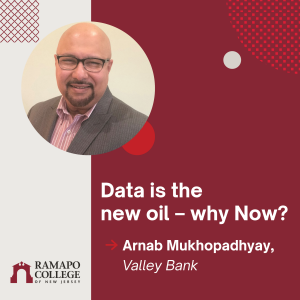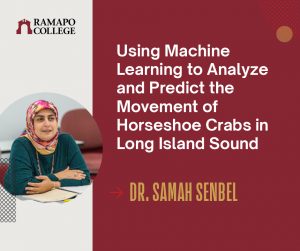- About Ramapo
- Academics
- Admissions & Aid
- Student Life
- Athletics
- Alumni
- Arts & Community
- Quick Links
- Apply
- Visit
- Give
Center for Data, Mathematical, and Computational Sciences
November 1, 2021Lecture Series: Data is the New Oil- Why Now?

Wednesday, November 10, 2021 at 5:00 PM until 6:00 PM – Eastern Standard Time
Ramapo College is proud to host a Graduate Lecture Series about a variety of interesting topics throughout the year.
During the RCNJ Lecture Series: Data is the New Oil- Why Now, you’ll have the opportunity to hear from Arnab Mukhopadhyay, Head of Enterprise Architecture at Valley Bank more about exploring a systemic or architecture-based viewpoint on exploring various aspects of data – ranging from an overview on data technologies, data integration, data analytics, data governance, and industry usage of data.
For more information about this particular topic, or questions about the event, please email Professor Scott Frees at sfrees@ramapo.edu and we will be happy to assist you.
You won’t want to miss this exciting and informative Graduate Lecture Series Event.
Categories: Lecture Series, Uncategorized
August 27, 2021Using Machine Learning to Analyze and Predict the Movement of Horseshoe Crabs in Long Island Sound

Dr. Samah Senbel, Assistant Professor of Computer Science at Sacred Heart University will be describing her work on developing machine learning models to predict animal movement patterns. Please join us (virtually) on Monday, September 27th at 1pm to learn more about this important area of study in ecology, conservation and wildlife management.
Connection details will be provided after registration.
Abstract: Developing models to predict animal movement patterns is an important area of study in ecology, conservation and wildlife management. Models can be used to decipher patterns in mark-recapture data and machine learning can help to make predictions about future animal movement patterns. Project Limulus (PL), a community research program, has been tracking the movement of tagged individuals in the population of American horseshoe crabs (Limulus polyphemus) in Long Island Sound since 1997. During the spring spawning season, horseshoe crabs are captured by hand in spawning areas along the Connecticut (CT) shoreline, tagged and then released. Recaptured horseshoe crabs give valuable information about their behavior, if they exhibit site fidelity and movement patterns around the Sound. In this paper, we tested various models to find the best predictor for the movement of spawning horseshoe crabs to shorelines in the Sound based on the observed movement activity in previous years. The dataset consists of all the previous horseshoe crab movements: initial longitude and latitude, sex, initial date, and recapture longitude and latitude and recapture date. This dataset has 19,219 recapture records covering twenty years of activity. We experimented with three different models: Linear Regression, Decision Tree, and Random Forest Regression models. We used the data for 2018 as our test set and the data of all previous years as our training set. The Random Forest Regression model proved to be the best predictive model for animal movement and resulted in the smallest RMSE and MAE, as well as the smallest maximum error in prediction. The predicted horseshoe crab locations can be targeted in the next season for recapturing previously tagged horseshoe crabs, which provides valuable information about their movement patterns. It also concentrates the scientists’ effort and time to find the maximum number of horseshoe crabs.
This talk is supported by a grant from the Ramapo College Foundation.
Categories: Data Science, Lecture Series, MSDS
January 21, 2021From Data Ethics to Data Justice: The Challenge of Building Better Worlds through Data Science
Dr. Andrea Pitts, Assistant Professor of Philosophy at the University of North Carolina, Charlotte will be describing this new new branch of study within applied ethics, a subfield in professional ethics that includes areas of research and practice such as computing ethics, media ethics, and biomedical ethics. This new branch of applied ethics responds, specifically, to novel applications and technologies for data storage, maintenance, and processing that add new layers to the study of morally relevant considerations within information ethics, business ethics, and AI ethics, for example.
Categories: Lecture Series, Uncategorized
November 20, 2019Data Science at ESPN: NBA player performance

Join us on December 5th to hear Brian Macdonald showcase how Data Science identifies the value of box score statistics in estimating NBA players’ contribution to on-court performance. Dr. Macdonald is the Director of Sports Analytics at ESPN, and has a doctorate in Mathematics from Johns Hopkins University.
Please join us in the York Room (Mansion) on December 5th at 4pm to hear about how these approaches can be applied to a variety of sports such as hockey, soccer, football, and eSports.
You’ll also have the opportunity to learn more about Ramapo’s new Data Science programs, launching this coming fall.
Categories: Data Science, Lecture Series
Copyright ©2025 Ramapo College Of New Jersey. Statements And Policies. Contact Webmaster.
